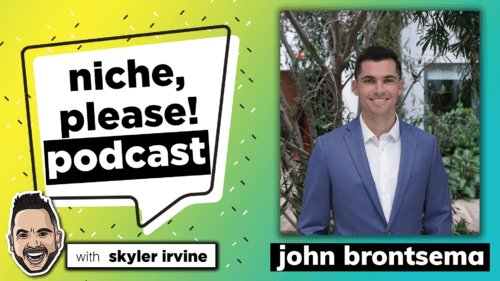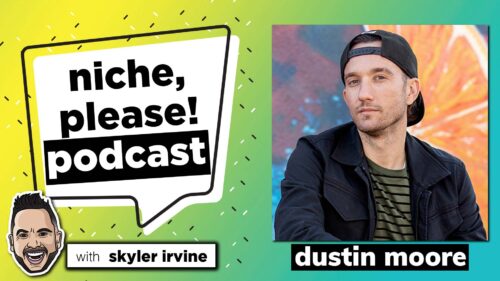I recently asked a group of podcasters: “What makes a great podcast guest?”
It might sound silly, it might seem generic, but you’d be surprised how poorly a lot of people approach this.
Podcasting isn’t like traditional PR, getting on someone’s podcast. You’re trying to get with someone who has a micro audience and isn’t a professional media person. They don’t have media training. They don’t have the same media agenda as a lot of publications do, so you have to approach it a lot differently, and doing so, number one, starting with value that you are bringing to the equation.
This seems simple and straightforward, but I’ll be honest, I’ve literally had more than one person send me a message on Instagram, DMs, or an email, saying nothing other than:
“Hey, bro. You should have me on your podcast,” and then that’s it.
The thing with that is it doesn’t really give you a lot of room to even respond to an inquiry like this.
How would you respond to something like that without really trying to, I don’t know, waste anyone’s time really, and if you’re busy and you’re producing a lot of stuff, and this podcast alone is an hour of my week that isn’t a full-time gig for me, it’s something I’m doing in addition to everything else, so you have to make it as easy as possible to communicate and work with people.
For example, coming from a position of, “Here is why you should have me on your show.”
Number one is value.
What is your value add? What do you bring into the equation? What is the reasoning I should have you on? Too many people come from a position of saying, “I want to be promoted, so have me on your show so I can get more promotions.”
That doesn’t help a podcaster, whether that person has five listeners or 500, or 5,000. Why would they want to have you on their show?
It really comes down to just that. How easy are you making it for them to see the value as quickly as possible? That one’s often overlooked.
Number two is research.
Actually, listen to the shows that you want to be on, so when you are approaching the host or you are reaching out to them, adding a little bit more to the equation, saying, “I really liked this episode where you talked to so and so. I feel like I could provide some value here,” or, “I know that your listeners are very interested in these types of concepts. Here’s something I’ve been working on, and I’d love to give them value by providing this insight,” or, “I had a counterpoint to a previous guest that you had. Would you be interested in having this conversation.”
This shows that you’ve put in at least some effort and you’re actually saying, “Here’s what this show would look like if you had me on.”
You’re doing some of the work ahead of time.
Number three: don’t be difficult.
And this is really important! This was brought up by way too many podcast hosts: be easy to communicate with, respond quickly, have flexible scheduling, and show genuine excitement. Remember who is doing the work. Hosting and producing a podcast is enough work without your guest adding their own difficulty to the mix.
This starts with the first point of contact and then throughout all communication. Respond quickly and be easy to schedule with.
You’re adjusting to them, and if you want to be on other people’s shows, you want to make it as easy as possible for them to be able to book you and refer you to others as well.
Number four: be an awesome guest everytime.
If you want to get invited on more podcasts then be an awesome guest on every podcast in which you are invited. Big or small, the last podcast you are on is the first piece of research any podcast host is going to start with.
Additionally, podcast hosts talk to other podcast hosts.
Many podcast hosts talk to each other daily, work with each other, refer to each other, and if you’re an awesome guest, you can move up this hierarchy ladder pretty quickly because people say, “Hey, this person was amazing. You should have them on!”
They are likely to refer you, and if you’re not good (and by good it has nothing to do with the content) it’s really about how easy or how difficult you are to work with.
Things like:
- Didn’t respond quickly,
- Never promoted the show.
- Speaks out of turn
- Had their own agenda
Additionally, because podcasters communicate often communicate with each other it’s really easy to kind of get blackballed from future shows without you ever learning why.
This works against you in a lot of different ways.
One of them is if you’re only planning to go on to shows to talk about the same things every time, there’s no reason for a new show to have you on because you’ve already had those conversations. They exist. If people want to know that, it already exists out there.
Number five: equipment.
For those of you that are doing guest interviews via Zoom calls or via phone calls, however, you want to do it, having a MINIMUM level of knowledge of how to capture quality audio is a MAJOR advantage. You don’t need to spend a lot of money, but having a familiarity with external microphones that hardwire (plugs into) your computer or phone directly, makes for better content and also easier editing for the producer.
Maintaining a consistent distance between the microphone in the same direction makes the editing process so much better.
For a lot of these podcasters who are editing their own shows, that’s really huge, and they know those things, and it can really take you out of it when you’re in a podcast interview with someone, and you’re constantly telling them, “Please talk into the mic, please talk into the mic,” it makes the editing process terrible, and it also takes you out of the interview flow.





